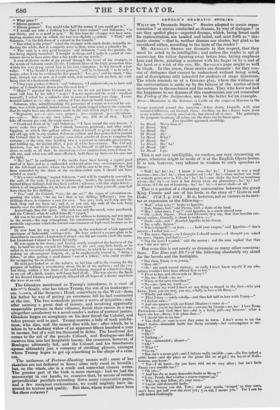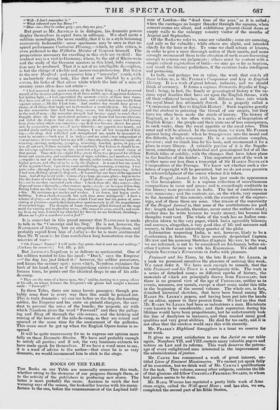ARNOLD'S DRAMATIC STORAMS:
WHAT are " Dramatic Stories ?" Stories adapted to scenic repre. sentation ? or stories conducted as dramas, by way of dialogue ? or are they spoiled plays—rejected dramas, which, being found unfit for representation, are headed and tailed, and sent forth as " dra- matic stories "—that is, neither dramas nor stories, but glad-to be considered either, according to the taste of the reader 1 Mr. AalloLn's Stories are dramatic in this respect, that they must be acted to be intelligible; and unless the reader is apt at conceiving the talker figuring away before him, laying emphasis here and there, pointing a sentence with his finger or by a nod of the head or a wink of the eye, Mr. ARNOLD'S page might as welt be blank. In this sense, these stories are dramatic ; for they con- sist of dialogues that cannot be understood without being acted, and of descriptions only intended for students of stage directions. The whole reminds us of a German play, where the wildness of the conversations is made up by the fulness of the matter-of-fact instructions to the machinist and the actor. They who have not had. the happiness to see dramas of this construction, nor yet remember the Poetry of the Antijacobin, may be the better for'an example.
Scene—Mountains in the distance—a Castle on the crags—a Mansiou in the valley. Troops quartered around the mansion—before dawn, Gonzelli, with nine
mounted followers, cut through them : dwelling on fire—flames burst front
every window—scarcely successively, but almost all at once. The paintings,
the gorgeous furniture, all ashes, ere the doors can be burst open.
Two banditti approach stealthily. 1st Band. We've done it !
2d Band. 'Iltu!
1st Band. Sli!
2(1 Band. Air!
1st Band. What?
2d Band. See!
1st Band. Ha! ha!
2d Band. Off!
1st Band. I go.
This is not very intelligible, we confess, nor very interesting on paper, whatever might be made of it at the English Opera-house. It is not, however, very inferior in wisdom to such speeches as these : "Well! ha! ha! ha! I know it was—ha! ha! I know it was a mad business—but—ha! ha !—thou needest not !—ha! ha !—thou needest not look so wountly grave over it, Ulf—ha! ha! ha !—nor shake thy head so wondrous wisely—ha! ha !—at least it has driven away my gloominess—ha! ha! ha I Ill swear, if I die not of laughing—ha! ha! ha !—1 never shall—at all."
This is a portion of a charming conversation between the great King Canute and one of his lords, in the story of" Godwin and. Goda." (Vol. I. p. 280.) It is, however, not so,. various in its mat- ter or expression as the following- " Well ! what news?" broke in Ippolito.
" Bad, Signor, bad," said Pietro, with a shake of the head. " Hey ! what news, I say?" said Ippolito, in a much altered tone.
" Olt—a deal, Signor. First and foremost, they say, that that horrible cut-
throat outlaw, Gonzelli, is about to make a—" " Pooh—ooh—ooh !" drawled Ippolito in his throat.
" No, a sally, Sie;nor." " Who's Ginzelli ?—at least. . .. hold your tongue," said Ippolito--" don't answer—I asked you—" " The news, Signor,—so I thought I should answer;—! thought you asked the news, Signor, and that's—" " Not the news I wanted," said the master : and the man replied that that was "the new news."
But even this is not nearly so dramatic as many other conversa- tions. The 11m8 and Eh ? s of the following absolutely cry aloud for the boards and the footlights.
"But then, Fanny is so young."
"How old ?"
"Oh ! not much turned sixteen; or really I don't know myself if my ado- rations wouldn't have been offered first to her."
"First to her, and afterwards to Bessy? "
"No, no—Frank—no, no."
" What, at the same time then?"
" No—no—'pon my word—" "And upon my word I don't see any thing so absurd in the fact—why you know, Tom, you are now, you say, witc;lly in love with Bessy—" "Wholly and solely—" " That I deny :—solely whogy—and then full half in love with Fanny—" "I declare now—" "And one quarter with our friend Meadows's sister at—" "No, no—you're too hard on me—you are, by George—no, no: I love Bessy Richardson—and God bless her—site is a lovely girl—my heavens! what a figure she has—Bessy, I do adore thee—" " I should like to see her." "You shall—as soon as ever they come to town. I don't mean to say she hasn't faults—damnable faults has Bossy certainly—her extravagance is un- bounded—" " Ilin ! "
"Eh?"
"Nothing—" "Yes—unbounded; almost—" "Oh!"
"What ? "
" Go on."
"But she's a sweet girl—and I believe really amiable_yes_sile has indeed a noble heart—and she plays on the piano like an at' gel ; she learnt of Kalk-
brenner, you know."
" Yes—I do know—for you have told me so very often ; but isn't little
Fanny very amiable too?" " Oh yes—" "And has she as many damnable faults as Bossy?" "I say, Frank, that's rather a coarse expresw.on.
"Why, lily dear fellow, it's your own----"
"I never said damnable faults."
"By my honour you did, Tom ; and your words, 'winged' as they were, can't have got half over the river yet; %, ou did, I aasnre still looked dtailainay. you." For 1 saw h
"Well—I don't remember it."
." What coloured eyes has Bessy?"
"Blue—no—they're rather grey—yes, they are grey."
But great as Mr. ARNOLD is in dialogue, his dramatic powers display themselves in equal force in soliloquy. We shall quote a sublime monologue, the more readily, that it is in a style becoming i
excessively fashionable : sonic specimens may be seen n that in- spired performance Contarini Fleming,—which, by able critics, is • even preferred to the Wilhelm Meister of GOETHE himself. The preparations necessary for excelling in this style are twofold : the readiest way is a visit to Germany, where, by the aid of Rhein-wein and the study of the German masters in this kind, lofty composi- tion may be produced. That it is not of an intelligible description, is but the charge of a feeble and narrow comprehension. But listen to the new Mw■fred ; and conceive him a " muscular" youth, with .a melancholy roving look, like that of one blinded by a gutta serena, his looks of that silver white which the hair of a man of seventy years often does not attain- " I had mastered the secret wisdom of the Hebrew King :—I had possessed myself of the theories and practices of all those middle ages of apparent darkness, 'nit hidden light :—I had superadded the accurate science of these later times, that have cast off the wisdom of their fathers, and worked their own lye:11th from separate mines.—All this I had done. And another day would have given a choice of all things that imply not in themselves a contradiction. My training fur this momentous time had been long—severe, but delightful and glorious to the soul of man.—My muscular strength had heroine equal to much that is thought above all, but mechanical powers ;—my frame had become adamant, and defied the dangers that even the savage dreads ;—my senses lied become keen above what others can conceive ;—my flesh was become almost fire-proof, and, by preparation, quite so ;—I never thirsted ;—my appetite was hearty, yet needed nearly nothing to appease it ;—hunger, I was all but incapable of feel- in sleep, that refreshed and strengthened me, might be measured al- most by minutes.—Such was I in body ;—and my mind—was independent of chcamstance; it was vassal but to my will : —buoyant, calm, collected, rapid, ab- stracting, classing, analysing, grasping, reasoning, fanciful, grave, or gay,—it was all and each of these instantly and immediately that I chose it should be so: the telescope awl microscope in one, were but a type of my mental vision at that period. Time stole on—night fell ;—every thing was prepared for all those forms and ceremonies, and combinations of signs, syllables, and numbers, which —negative in and of themselves—are blessed, under certain circumstances, by higher powers, and allowed to ho so by the Highest. It wanted but OM watch of the appointed hour. I paced my room recollecting, reasoning, arranging. I was quite cahn—through prayer, long self-strengthening, awl self-mastering. At last I had seen all things propeely disposed.—It wanted hilt one hour of the appointed hour. And all was to my wish : visions of joy, hope, pleasure, glory—began to rise like the fumes of wine before my brain : 1 quelled them :—one by one 1put them by ; one by one they succeeded each other : I shook them off; they rearose—thev dispersed more reluctantly,—they rearose again—singly-or in vague fellowship, flitting before me like the many changing, vanishing, and reappearing flames of a fire. iSly resistance got weaker and weaker. I sat down, and began castle- building. I often checked myself, but each time more indulgently : I drew a scheme of glory,—or rather my ideas—which I had now lost the power of asso- ciating at pleasure—marshalled themselves spontaneously in all the magnificence of uncurbed hope. The thought of Annie Seymour glided forward on the stage amid the varying and resplendent scene—She cannot be mine, cried I; and start- ing from my seat, I dashed my clenched fist fiercely on my forehead, shrieking— Damn me .1—for a murderer and a pol !"
It is somewhat in this grand manner that NAPOLEON is made to talk in the " Conscript and his Dog." He is not, however, the NAPOLEON of history, but an altogether dramatic Napoleon, and probably copied from him of elstley's—for he is more sentimental than Mr. AV A.RDE'S : he thus concludes a long lamentation over the miseries of war— Oh France ! France ! I will make thee great—but it cost me not nothing." [Cockney for slut/neat.] Vol. III. p. nal.
But ARNOLD'S Napoleon is as delicate as sentimental. One of his soldiers wanted to kiss his hand : "Don't," says the Emperor —" the dog has just licked it :" however, the soldier perseveres, and kisses the savoury spot: upon which, Napoleon examines the hack of his hand, and, as if distinguishing canine exudation from human tears, he points out the identical drops to one of his aids- de-camp.
"They are the tears of a brave man, Sir ;" said he, turning to a young officer at his side, on whose features the Emperor's side glance had caught a nascent smile : " Forward ! "
In these Tales, there are many heroic passages; though pro- bably none finer in every way than this could be pointed out. This is truly dramatic : we can see before us the dog, the kneeling • soldier, the Emperor and his suite on piebald chargers, the saw- dust to prevent the noise of the boards ; the majestic air with which Napoleon gives the word " Forward!" and then the gallop- ing and filing off through the side-scenes, and the kicking and rearing of the horses of the aids-de-camp, as they are reined and spurred at the same time for the amusement of the galleries. This scene must be got up when the English Opera-house is re- opened.
It will be quite unnecessary for us to express our opinion more fully on these Dramatic Stories. We have said probably enough to satisfy all parties; and if not, the very luminous extracts we have made speak for themselves. If we have a word more to say, at is a word of advice to the author—that since he is so very dramatic, we would recommend him to stick to the stage.




























 Previous page
Previous page